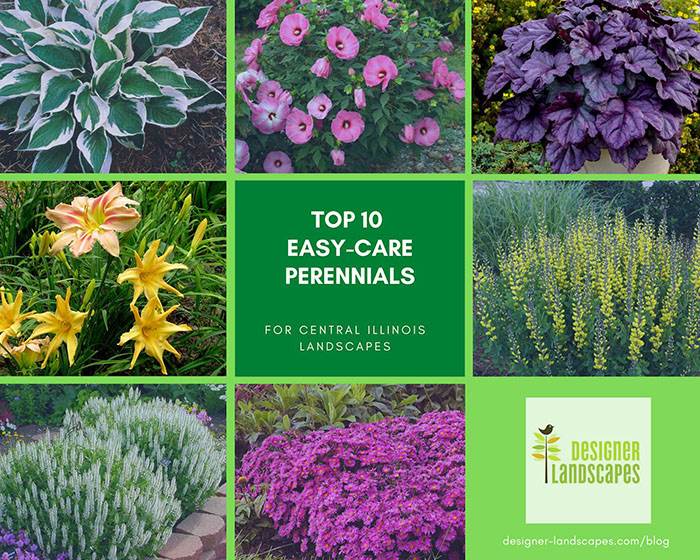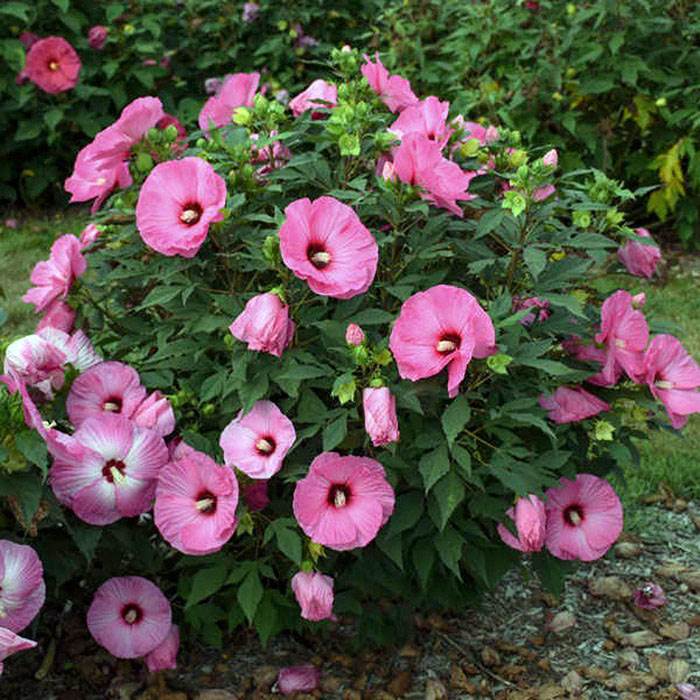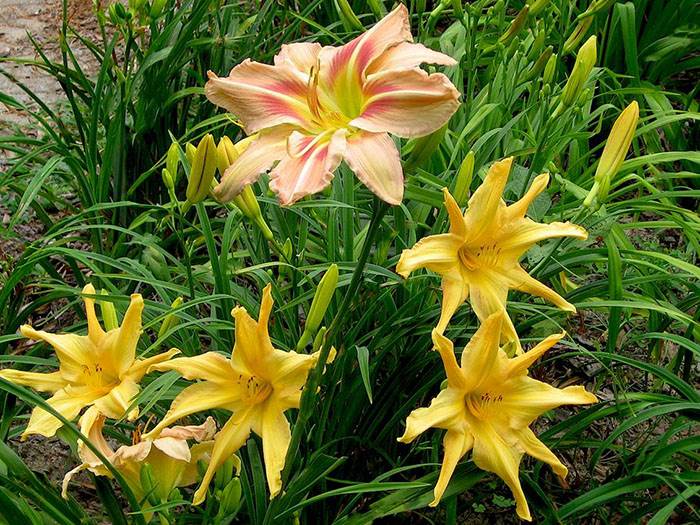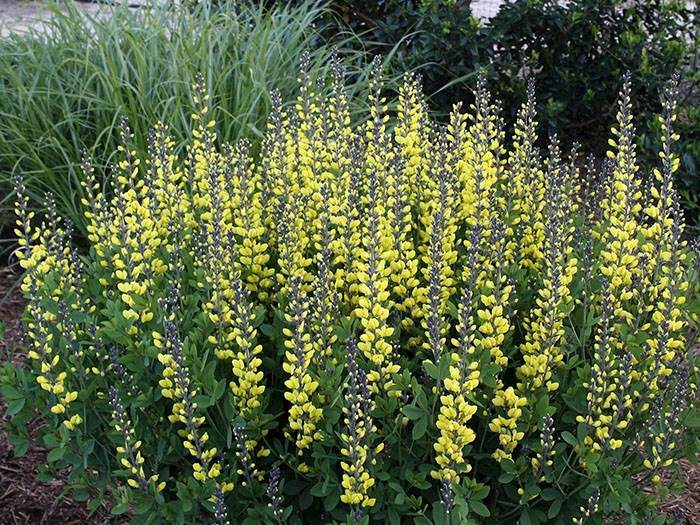
Wondering what are the best perennial flowers for Illinois?
With Illinois' changing seasons, there are countless numbers of flowers and plants that grow well in the Midwest. Perennials make your garden landscape beautiful year after year.
Here's our list of the best perennial plants to grow in Illinois. Not only are these good growers, but they are also low maintenance perennials that are adaptable to many soil and weather conditions.
Be sure to download a pdf list of these perennials and contact us to add them to your landscape!
10 Easy-to-Care-For Illinois Perennials

1. Coral Bells
Coral Bells make a fantastic addition to any landscape bed. There are many different varieties to choose from for either sun or shade. Only growing about 18” tall, they will fit into almost any planting bed as a border grouping or paired with other perennials. They also come in many different colors, which makes it easy to add more color without taking up too much space. Some of our favorite varieties are Pretty Pistachio (green), Wildberry (bright purple), and Caramel (caramel/orange). One extra “feature” that makes Coral Bells stand out is that they are considered semi-evergreen. Much of the foliage will stay on the plant all year round, even retaining most of its brilliant color! See 16 more Coral Bells

2. Hostas
A staple in any shade garden, hostas are incredibly tolerant of low sunlight areas. There are many different varieties of colors, sizes, and shapes that can add a lot of interest in an otherwise boring area of your landscaping. Hostas can be as small as 18” tall -like the ‘Dancing Queen’ hosta- or as large as 5 feet tall -like the ‘Empress Wu’ hosta! Colors range from blue, green, and yellow, to variegated combinations of blue, ivory, and green. There really is a hosta for everyone! See 30+ hostas

3. Karl Foerster Grass
Ornamental grasses are great for many reasons. They come in all shapes and sizes, so they can fit into almost any landscape. Karl Foerster is especially nice because of its tall and slender shape. It stands around 4-5’ tall, but only about 2’ wide. Some ornamental grasses have the tendency to spread and multiply, but Karl Foerster doesn’t! Because of its tall height and narrow spacing, it makes a wonderful backdrop that even looks good through the winter. See 3 varieties of Karl Foerster Grass

4. Hibiscus
Most people will recognize the huge blooms of a Hibiscus, but not many people know that we can actually grow a few varieties here. Hibiscus is most commonly seen in tropical regions, like Florida. This is a great way to bring that same tropical feel into your own landscape! Depending on the variety, Hardy Hibiscus can grow anywhere between 3'-5’ tall and wide, with colors ranging from white to pink to red on the huge 10” blooms. Hibiscus is one of the last perennials to start growing in the spring, but once they start growing you’ll be amazed at how fast they reach their full height. You can expect them to start blooming around the 4th of July, just in time for summer parties! Check out 10 beautiful varieties of hibiscus

5. Variegated Liriope
Similar to Coral Bells, Variegated Liriope can be a very diverse plant. It grows well in the sun or shade and brings a beautiful green and white display that’s perfect for a border planting. Variegated Liriope looks similar to Monkey Grass, but it won’t spread so it is much easier to keep contained. See liriope details

6. Dwarf Lythrum
Purple Loosestrife is considered an exotic & invasive plant in Illinois, but don’t let that scare you away from Dwarf Lythrum. The growth and production of Dwarf Lythrum is very regulated, and as long as it comes from a reputable nursery, it will be a sterile variety that does not spread or reproduce. Dwarf Lythrum is a beautiful plant that brings many benefits to your landscape. It’s a plant that pollinators love, the bloom is a beautiful bright pink, and it has a bloom time that is longer than most perennials, so you get so much color out of one plant. See more lythrum

7. Salvia
Salvia is a plant that really reflects its beauty with how much work you put into maintaining it. It can be a very low-maintenance plant that gives beautiful color in the summer before the blooms fade. However, if you are willing to cut back the faded blooms, it will rebloom into the fall and extend the time that you can enjoy the color! The most common varieties are deep purple, but in recent years new varieties have developed including sky-blue and white. Most salvia are between 18”-24”, so it’s easy to find a spot to plant one. See 4 varieties of salvia.

8. Daylilies
Daylilies have been a staple in landscaping for many years because they are incredibly hardy. A lot of people think of the yellow ‘Stella’ daylilies, but there are so many new varieties and colors that have a place in your landscape. Daylilies are very tolerant of adverse weather conditions as well as terrain. They are a deep-rooting perennial, which makes them a great choice if your planting bed is on a steep slope. They will hold their place without becoming uprooted and hold the soil around them. There is a large range of sizes as well – anywhere from 18” tall all the way up to 30” tall. This gives daylilies a diverse role in your landscaping, by serving as a shorter border plant, or a tall background plant behind your other perennials. See daylilies

9. Aster
Asters are another perennial that have been a staple in landscapes for many years. However, just like daylilies, there are many new and improved varieties. Some of our favorite new Asters come from the ‘Kickin’ series. They are a bit larger than older Asters -reaching 24” tall and wide- and they are a true display of color in the fall. The green mound of foliage is quickly covered in a blanket of purple or pink flowers that help extend the color of your landscape well into the fall. Check out 5 varieties of asters

10.Baptisia
Baptisia are a great way to bring spring color into the landscape. Growing around 3’ tall and wide at full maturity, these make a nice background in most landscapes. The most common colors are blue/purple, yellow, and a yellow & pink mix. The seed pods will turn a dark charcoal color after flowering, which provides more ornamental interest. These are also a nice addition to a cut-flower arrangement. More baptisia
Like these plants? Download a list of these best flowers and plants for Illinois. Contact us for a free estimate to bring these beauties to your yard this year!